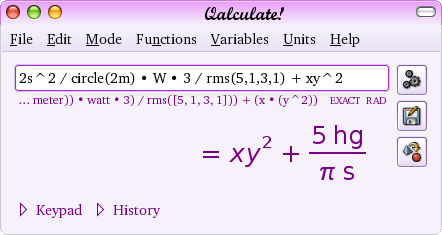6
3
I want to be able to press a keyboard combination, start typing a mathematical expression that includes units and slightly advanced math (not just a four-function calculator), and get a result immediately, in units that I specify, that I can copy and paste.
- Currently I open Firefox and press Ctrl+K, type in the search box, and it usually gives me a result in the drop-down from Google Calculator. It doesn't always, though, so I press "=" at the end, wait for a result, remove the equals, wait for a result, realize it doesn't understand the way I typed a unit, open the result in a new tab, etc. it sucks.
- Wolfram Alpha is smarter, but very much slower, and the output is all images, not text, and I don't have a quick widget for it, if such a thing could even exist.
- GNU units has a ton of units, which is great, and I can define my own units, which is great, but they have to be written in specific, unintuitive ways, it doesn't handle much advanced math, and I'd need to open a terminal, start units, etc. I hate the command line.
- I wasted a lot of time trying to make front-ends for
unitsin Deskbar and Launchy, but I'm not a real coder and I don't use either of those anymore.
Any other solutions or enhancements of these?
(Cross-platform is best)
The ideal unit-aware calculator would be able to handle all of these:
7 nV/sqrt(Hz) ⋅ sqrt(20000 Hz - 20 Hz) → μV= 0.99 μVsqrt(4*k*25 °C * 1 kΩ * (20 kHz - 20 Hz))= 0.57357 μV3.5 billion kilowatt-hours per year= 399.5 MW60 billion kWh per year= 6.849 GW1/sqrt(2 mH * 2 nF)= 500 kHz1/(2*pi*10 kΩ * 22 µF)= 0.7234 Hz1/(2·π·100 Hz·30pF) → ohm= 53.05 MΩ−10 dBV + 4 dB + 10 dB − 12 dB → dBu= -5.782 dBu94 dBSPL → Pa= 1.00237 Pa54 inches + 2 feet → cm= 198.1 cm12 V ÷ 141.5 µA= 84.8 kΩ16 bit * 44.1 kHz * 2 → kbit/s= 1411 kbit/s1 hundred V / 5 ohms= 20 Afurlong per fortnight → cm/minute= 0.9979attoparsec/microfortnight → in/second= 1.0041 ft / speed of sound= 0.89576 ms

1What is the level of complexity of the problems you are trying to solve? – spowers – 2010-04-26T00:33:12.917
What did you try to script that a combination of
bc -landunitscouldn't do? – Benjamin Bannier – 2010-04-26T00:38:50.2501Can you give an example of using
bc -landunitstogether? I didn't know that was possible. – endolith – 2010-04-26T15:04:54.077@honk: sounds like something you should post in an answer (y'know, with an example). @endolith: use @ for comment notifications so the user gets notified when you reply to them.
– quack quixote – 2010-04-26T15:29:15.527@endolith: Actually my comment was too fast,
bcdoesn't gain you anything if you do not plan to define your own functions . The trigonometric, exponential and logarithmic function are all already defined inunits(only Bessel functions are missing). – Benjamin Bannier – 2010-04-26T19:48:42.317@quack quixote: There should be a reply button for that. – endolith – 2010-04-27T23:12:20.687
@endo: suggest it on meta if you like... :)
– quack quixote – 2010-04-27T23:41:43.457this should be on [softwarerecs.se] – phuclv – 2019-03-24T09:31:09.300
@phuclv Yes, but it didn't exist when this was asked – endolith – 2019-03-25T14:24:59.587